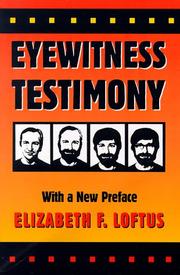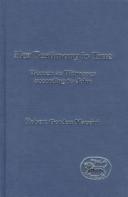| Listing 1 - 3 of 3 |
Sort by
|
Book
ISBN: 0805818650 Year: 1996 Publisher: Mahwah Erlbaum
Abstract | Keywords | Export | Availability | Bookmark
 Loading...
Loading...Choose an application
- Reference Manager
- EndNote
- RefWorks (Direct export to RefWorks)

ISBN: 0674287770 9780674287778 Year: 1996 Publisher: Cambridge, Mass. Harvard University Press
Abstract | Keywords | Export | Availability | Bookmark
 Loading...
Loading...Choose an application
- Reference Manager
- EndNote
- RefWorks (Direct export to RefWorks)
Every year hundreds of defendants are convicted on little more than the say-so of a fellow citizen. Although psychologists have suspected for decades that an eyewitness can be highly unreliable, new evidence leaves no doubt that juries vastly overestimate the credibility of eyewitness accounts. It is a problem that the courts have yet to solve or face squarely.In Eyewitness Testimony, Elizabeth Loftus makes the psychological case against the eyewitness. Beginning with the basics of eyewitness fallibility, such as poor viewing conditions, brief exposure, and stress, Loftus moves to more subtle factors, such as expectations, biases, and personal stereotypes, all of which can intervene to create erroneous reports. Loftus also shows that eyewitness memory is chronically inaccurate in surprising ways. An ingenious series of experiments reveals that memory can be radically altered by the way an eyewitness is questioned after the fact. New memories can be implanted and old ones unconsciously altered under interrogation.These results have important implications for court reform, police interrogation methods, defense strategy, and many other aspects of criminal and civil procedure. Eyewitness Testimony is a powerful book that should be required reading for trial lawyers, social psychologists, and anyone who considers the chilling prospect of confronting an eyewitness accusation in a court of law.
Psychology and law --- United States --- Eyewitness identification --- Forensic psychology. --- Psychological aspects. --- Forensic psychology --- Psychological aspects --- United States of America

ISBN: 1850755884 9781850755883 Year: 1996 Volume: 125 Publisher: Sheffield: Sheffield academic press,
Abstract | Keywords | Export | Availability | Bookmark
 Loading...
Loading...Choose an application
- Reference Manager
- EndNote
- RefWorks (Direct export to RefWorks)
In Her Testimony is True, the Gospel of John is analysed as a rhetorical work that uses the metaphor of a trial in order to persuade readers that the Messiah is Jesus. John's presentation of women as witnesses in that trial is examined within the framework of Jewish law and custom regarding women as witnesses. Maccini concludes that the role of the women as witnesses follows no stereotypical pattern; that the women as witnesses, like the men, are treated as individuals, not as a class; and that in no case do any of the women bear witness in a way that breaches Jewish law and the custom of the
Witness bearing (Christianity) --- Witnesses. --- Women in the Bible. --- 226.5 --- Witnesses --- Women in the Bible --- Testimony --- Evidence (Law) --- Eyewitness identification --- Bearing witness (Christianity) --- Personal evangelism --- Testimony (Christianity) --- Witnessing for Christ --- Apologetics --- Evangelistic work --- Evangelie volgens Johannes --- Bible. N.T. John -- Criticism, interpretation, etc. --- Witness bearing (Christianity). --- Religion --- Philosophy & Religion --- Christianity --- Bible. --- Jean (Book of the New Testament) --- Johanisi (Book of the New Testament) --- Johannesevangelium --- John (Book of the New Testament) --- Yohan pogŭm --- Yohane den (Book of the New Testament) --- Yūḥannā (Book of the New Testament) --- Criticism, interpretation, etc. --- Ioganaĭ (Book of the New Testament) --- Иоганай (Book of the New Testament)
| Listing 1 - 3 of 3 |
Sort by
|

 Search
Search Feedback
Feedback About UniCat
About UniCat  Help
Help News
News